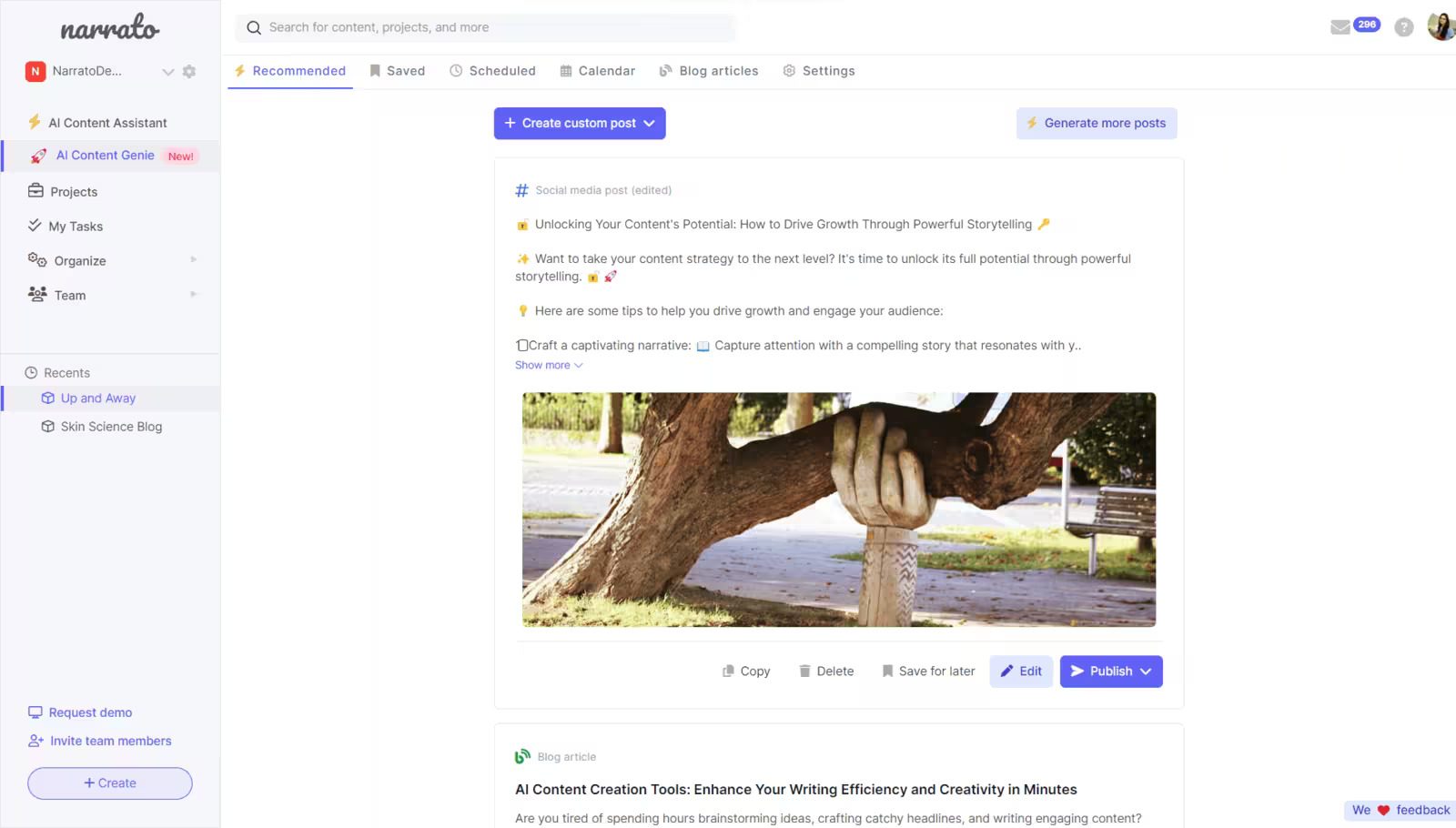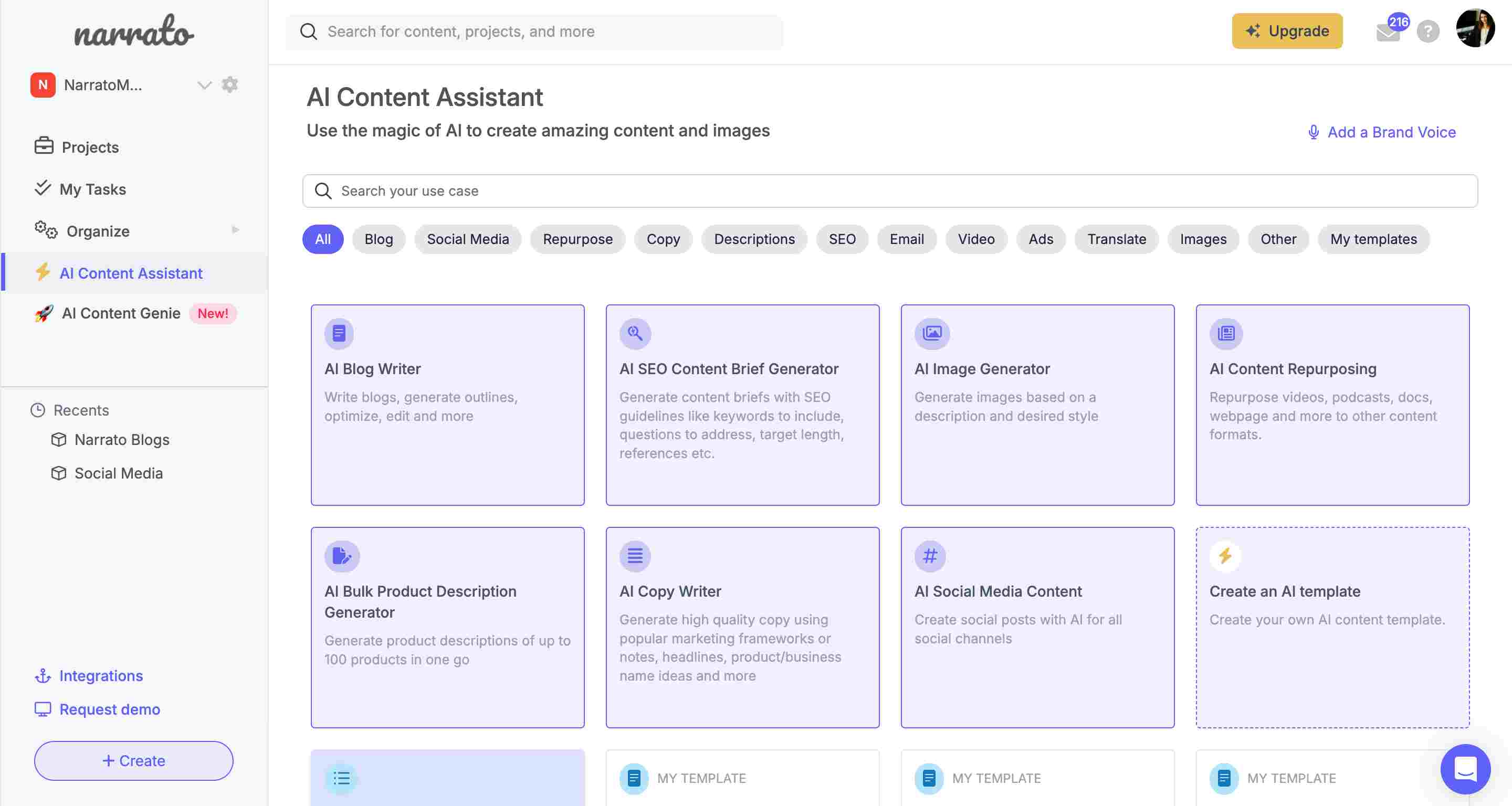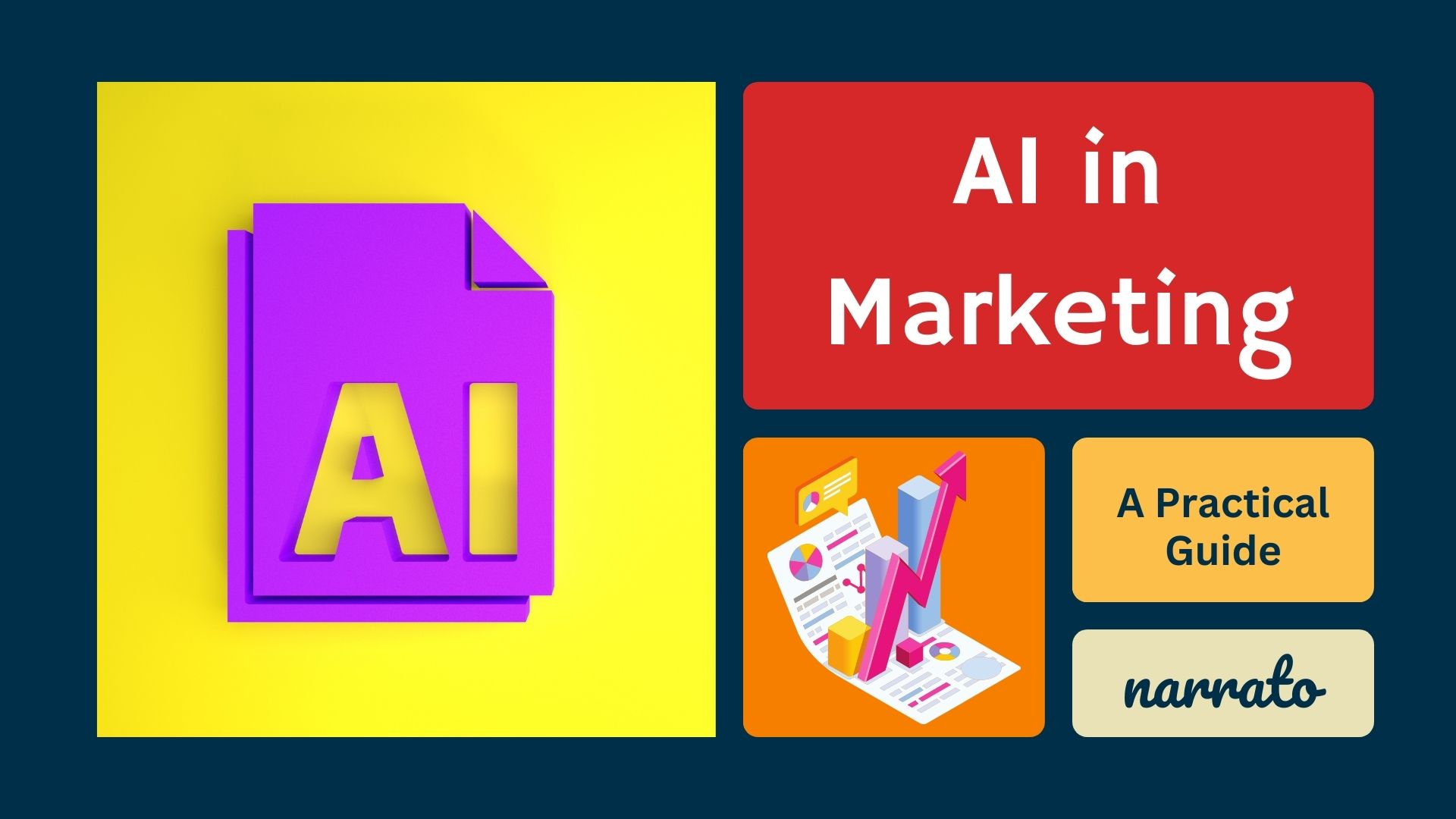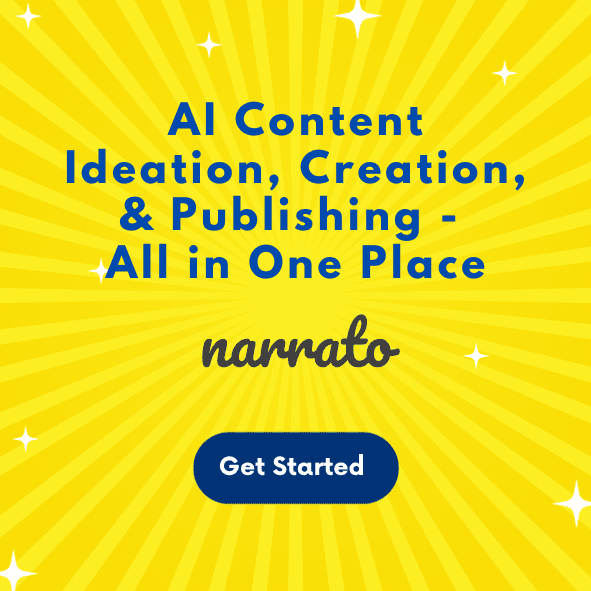Artificial Intelligence (AI) has emerged as a game-changer in the ever-evolving digital marketing landscape, revolutionizing how brands engage with their audience. It cannot be denied that generative AI tools are reshaping the world we live in. What’s so cool is the unprecedented opportunities AI provides for personalization, efficiency, and decision-making in marketing.
From automating content creation to extracting insights from complex data, AI is not just a futuristic concept but a practical tool that is here now, and anyone can use it effectively.
In this article, I’ll go into the potential AI presents for marketing and marketers while exploring how it can supercharge your campaigns, streamline your workflows, and accurately predict market trends.
- Understanding AI’s potential
- Optimizing your marketing workflow
- Implementing AI solutions
- Measuring and refining your data
- Beyond the AI hype

Whether you’re a seasoned marketer or just starting to explore the possibilities, let’s get into the details and strategies needed to use AI to optimize your marketing processes.
Understanding AI’s potential
No one truly knows what AI’s long-term potential is at this point, but it appears to be limitless and really fun to use in marketing!
Supercharge your campaigns: AI tools that automate and personalize
“Artificial Intelligence is the new electricity. Just as electricity transformed industries a hundred years ago, AI is now poised to do the same,” says Andrew Ng, a globally recognized leader in AI.

Andrew Ng on X + link to DeepLearningAI article
AI tools are incredibly efficient at automating a wide range of tasks, from email marketing to customer segmentation, freeing up more of your valuable time.
These tools excel at personalizing marketing campaigns and leveraging consumer data to tailor content, offers, and interactions to individual preferences and behaviors.
The drive to automate and personalize marketing campaigns stems from a need for efficiency and relevance in a crowded digital space.
Automation streamlines marketing processes and reduces human error.
It can also increase productivity, while personalization addresses the growing demand for more meaningful engagements.
Together, they create a powerful synergy that significantly enhances the impact and effectiveness of your digital marketing strategies.
Content creation on autopilot: AI’s power to write, design, and analyze

AI-driven content creation tools are transforming the marketing landscape. They use advanced algorithms to generate written content, graphic designs, and even video content with remarkable speed and efficiency.
These tools analyze existing data and trends to produce content that resonates with your targeted audience, often with little human intervention.
Narrato is a great example of an AI-powered content tool that can help you streamline and speed up the content creation process, while also improving the quality of the content you produce. The 100+ AI tools and templates on the platform can create content for a variety of use cases including blogs, social media, web copy, emails, product copy, video description, images, and more.
You can use AI tools to create long blog articles from scratch, using just a topic or a keyword. The AI long blog article generator will first give you a detailed outline for your topic, which you can modify as required, and then generate the entire article in seconds.

With AI comes the convenience of content creation on autopilot too. That is when you get content generated automatically, without even having to move a finger. Narrato’s AI Content Genie does exactly that for you. All it needs is a one-time input of your website URL and some themes around which you’d like content generated. The Genie can then auto-generate fresh social media posts and blog posts every week, keeping your content pipeline full. You can even schedule or publish the content directly to Facebook, Instagram, LinkedIn, WordPress, and Webflow. For any other CMS or app, you can build custom integrations for publishing as well.

Having an AI content creation and marketing platform like Narrato allows you to manage your entire content process in one place, end-to end. It has strong project management and team management features too that make it an all-in-one solution.
If you haven’t tried it yet, Narrato is just a click away!

The primary benefit of using AI lies in its ability to save time and resources, enabling you to produce higher volumes of content consistently and quickly.
The challenge lies in ensuring that the content it generates maintains your natural and authentic voice.
It has to align with your brand values and messaging while also navigating the complexities of creative nuances that AI may not fully capture.
Beyond guesswork: Using AI to predict & optimize marketing decisions
Leveraging AI for predictive analysis marks a significant shift in marketing from reactive to proactive strategies, where AI algorithms are adept at forecasting market trends and consumer behavior.
“AI is the crystal ball of the 21st century. It has the unprecedented ability to foresee market movements and consumer trends with an accuracy we’ve never seen before,” remarked Dr. Helen Wang, a renowned expert in market trends and forecasting.
These systems analyze vast arrays of data, identifying patterns and insights invisible to the human eye, which allows marketers to anticipate future market movements with incredible accuracy.
PecanAI has emerged as a frontrunner in predictive analytics. They use AI algorithms to analyze complex datasets, enabling businesses to effectively predict consumer behavior and market trends.
This proactive approach ensures that marketing efforts align with future market dynamics, leading to better resource allocation, higher ROI, and a stronger competitive edge.
Addition, not subtraction: The necessary human-AI collaboration
As valuable as AI is to marketing, it’s crucial to understand that AI-generated content cannot just be copied and pasted. AI tools will never replace human marketers; they add to the team.
The essence of effective marketing lies in its ability to connect on a human level, something that AI, as of now, cannot fully replicate.
While AI excels in analyzing data and producing content at scale, it often lacks the nuanced understanding of human emotions, cultural contexts, and the subtle art of storytelling that resonates deeply with audiences.
Therefore, the role of marketers remains highly critical in this collaboration.
You must oversee and refine AI-generated content, ensuring it aligns with your brand’s voice, values, and the unique needs of your target audience. Though tools like Narrato’s AI brand voice generator allow you to infuse your style and tone into AI-generated content very convincingly, human oversight is still essential.
Marketers bring empathy and creativity to the table that AI can’t, making your involvement essential in shaping content that informs, engages, and inspires.
Human-AI collaboration is about striking the right balance using AI’s efficiency and data-driven capabilities.
Then, infuse the content with human insight and creativity only you can provide to maintain authenticity, relevance, and emotional appeal.
Optimizing your marketing workflow
If nothing else, adding AI components to your digital marketing strategy will free up so much more time, allowing you to focus on creative work and eliminate repetitive tasks.

Identify the bottlenecks: Where AI can streamline your marketing process
Addressing bottlenecks is crucial if you want to grow and become more efficient.
AI shines in its ability to analyze operational workflows and pinpoint areas where processes lag or resources are misallocated.
For instance, AI can identify time-consuming tasks like data entry or lead qualification that could be automated.
By implementing AI, you can focus on strategic decision-making and creative aspects of marketing rather than getting bogged down by routine tasks.
This optimization leads to time savings and a more streamlined and effective marketing strategy.
From manual to machine: Automating repetitive tasks for maximum impact
For small businesses, this is the game-changer. Simple tasks like scheduling social media posts, sending follow-up emails, or segmenting customer lists can be automated using AI tools.
This transition from manual to machine doesn’t just save time; it enhances accuracy and consistency.
Digital marketing expert Neil Patel remarks,
“AI in marketing isn’t about replacing humans; it’s about augmenting human capabilities to achieve more with less.”
This automation allows you to reallocate your focus and resources to more complex and impactful marketing initiatives, thus maximizing the overall marketing impact.
Data-driven insights: How AI uncovers hidden gems in your marketing data
In the vast sea of data that you will accumulate, AI is an invaluable tool for uncovering insights that might otherwise remain hidden.

AI algorithms can analyze customer behavior, market trends, and engagement metrics to provide actionable insights.
These insights can guide you in fine-tuning your marketing strategies, targeting the right audience, and improving customer engagement.
As AI expert Emily Chen puts it, “AI democratizes data analysis, enabling small businesses to make informed decisions that were once exclusive to larger corporations with dedicated data teams.”
Using an AI tool for data analysis allows you to not only understand your current market position better but also predict future trends and customer needs.

Implementing AI solutions
Adopting AI solutions is no longer a luxury but a necessity. Regardless of size, many competitors are already several months into the process. But not to worry!
As quickly as AI technology is advancing, we are all learning together. That is the whole purpose of this article.
Choosing the right tool for the Job: A practical guide to AI marketing platforms
Selecting the right AI marketing platform is critical and should be based on a thorough understanding of your business’s specific needs and desired outcomes.
Here are four types of AI marketing platforms and their benefits:
Customer Relationship Management (CRM)
Enhances customer interaction by predicting customer needs, offering personalized suggestions, and automating follow-ups.
AI-powered Content Management Systems (CMS)
Streamlines content creation and distribution by suggesting topics, optimizing SEO, and personalizing content for different audiences.
Predictive analytics tools
Analyzes customer data to forecast future buying behaviors, helping in targeted marketing and inventory management.
Chatbots and virtual assistants:
Provides 24/7 customer service, automating responses to common queries and gathering valuable insights to improve customer loyalty.
Seamless Integration: Making AI work with your existing marketing stack
The ease of integration is crucial when selecting an AI tool, as it ensures a smooth transition and maximizes the utility of existing resources.
For example:
- Integrating AI analytics with email marketing tools: An AI analytics tool can be integrated with platforms like Mailchimp to analyze customer engagement and optimize email campaigns based on customer behavior patterns.
- AI-powered social media tools with social platforms: Tools like Buffer or Hootsuite can incorporate AI to optimize posting times, analyze social engagement, and tailor content to audience preferences across different social media platforms.
Conquering the AI adoption curve: Common challenges and how to overcome them
Adopting AI can come with its set of challenges, but you can effectively manage them:
- Skill gap: Invest in training for your team to understand and efficiently use AI tools.
- Data quality and quantity: Ensure you have high-quality, relevant data to analyze.
- Integration: Choose AI tools that are compatible with your current marketing stack.
- Cost concerns: Start with cost-effective or freemium AI tools before investing heavily.
- Resistance to change: Encourage a culture of innovation and demonstrate the tangible benefits of AI to gain team buy-in.
Through careful selection, integration, and management of AI tools, businesses can enhance their marketing strategies and maintain a competitive edge in their respective industries.
Measuring and refining your data

How can you know if investing the time and resources into implementing AI in your marketing is worth it? By measuring results, of course.
Before you do anything, gather statistics and metrics now – before introducing AI. It will provide the baseline. Now, let’s look into what comes next.
Tracking your progress: Key metrics for measuring your success
To gauge the success of AI in your marketing efforts, tracking specific metrics that reflect the impact of AI integration is essential.
Some of the key performance indicators (KPIs) to begin with are:
- Conversion rates: Are you selling more since adding AI?
- Engagement levels: Are you getting more email opens and clicks?
- Return on investment (ROI): Are you earning more than you spend?
- Customer acquisition costs (CAC): How much do you spend to gain one new user?
- Lifetime value (LTV): How much is one customer worth to your business?
These are just a few KPIs that can provide you with the insights you need to determine the efficiency and long-term effects of AI-driven strategies.
PRO-TIP: Success in AI marketing is not only marked by improved numbers but also by the enhanced customer experience and streamlined operational processes that directly contribute to these improved metrics.
Data-driven decisions: Using AI insights to fine-tune strategies
AI-driven insights are invaluable for fine-tuning marketing strategies to align with customer preferences and market trends.
For instance, AI can reveal patterns in customer behavior, indicating the most effective communication channels or engaging types of content.
AI in contact center software can analyze customer data to identify which channel, either phone calls, emails, or live chats, is the most successful and preferred for different customer segments or specific inquiries, letting you optimize your communication strategies and enhance customer satisfaction.
Another practical example is an AI analysis revealing that a significant portion of your audience interacts more with video content.
This insight can prompt a strategic shift to focus more on video marketing, potentially leading to higher engagement rates.
Leveraging such insights enables marketers to make informed decisions, ensuring your strategies are data-driven, highly targeted, and relevant.
Continuous improvement: Optimizing your AI marketing for better results
Regularly review the performance data collected by AI tools to identify areas where you can elevate your strategies and always test new approaches.
For instance, if AI analytics suggest a particular demographic needs to be more effectively reached, adjust your targeting criteria or content strategy accordingly.
Staying updated with the latest AI advancements and trends ensures that marketing strategies remain cutting-edge.
SuperhumanAI is a terrific source of information, and their newsletter is a must-subscribe. It is full of the latest news in AI, along with actionable steps and how-tos aplenty.

I read every single email from beginning to end and often find new tools and fun ways to get more out of my efforts.
Regularly revisiting and refining AI strategies based on new insights and learnings will lead to progressively better results, keeping your marketing efforts agile and effective in an ever-evolving digital landscape.
Beyond the AI hype: Ethical considerations for responsible marketers
As AI becomes more integrated into marketing practices, it brings with it a host of ethical considerations that responsible marketers must navigate:
- Data privacy and security: Ensuring the protection of customer data and adhering to data privacy laws like GDPR and CCPA.
- Bias and fairness: Actively working to identify and mitigate biases in AI algorithms to avoid unfair targeting or exclusion of certain groups.
- Transparency and accountability: Being transparent about using AI in marketing campaigns and decisions and being accountable for AI-driven outcomes.
- Consent and choice: Respecting user consent for data usage and providing options for users to opt out of AI-driven personalization.
- Impact on employment: Consider the impact of AI automation on marketing jobs and strive for a balance between technological efficiency and human employment.
By addressing these ethical considerations, such as securing data with reliable services like AWS backup, marketers can ensure that their use of AI aligns not just with regulatory compliance but also with broader societal values and the trust of their audience.
It’s about harnessing the power of AI while upholding a commitment to ethical responsibility and integrity in marketing practices.
Wrapping up
Artificial intelligence is not just a fleeting trend but a fundamental shift in how we approach and understand consumer engagement.
The potential of AI is vast and, and when done correctly, can transform your entire approach to your digital marketing strategy.
However, the journey doesn’t end here. The landscape is constantly evolving, and with it, new opportunities and challenges will arise.
Remember, the power of AI in marketing lies not in replacing human creativity and intuition but in augmenting it.
It’s about how to uncover insights, automate mundane tasks, and personalize the user’s experiences while relying on human judgment and empathy to guide these tools.
Experiment, learn, and evolve with AI, and watch as it opens new horizons for your marketing strategies, workflows, and outcomes.

Author bio:
Mick is the Growth Marketing Manager at POWR. His marketing career spans two decades, primarily in growth marketing in the healthcare space, with stints in broadcast television, advertising, and copy editing.
Mick has been using AI for nearly two years and has adopted many tools into his daily use. They are a very small team of 3 at POWR, so automating as much as possible was a no-brainer. Mick attended the College of Journalism at the University of Louisiana – Monroe, and is a storyteller at his core. His wife Elizabeth, son Gavin, and pup Jolene call Lafayette, Louisiana home.
Follow Mick on LinkedIn.




